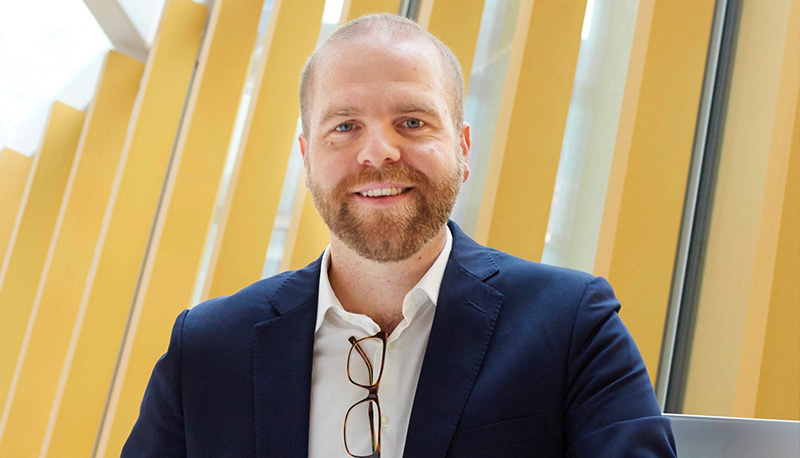Mentoring
Help shape the future workforce while supporting your staff’s professional development
Guest lecturing
Promote your organisation and bring real-world industry perspective into the classroom
Our commitment to practical, industry-connected learning means our students and graduates have the right skills, knowledge and experience to succeed in your workplace.
Hosting an intern through a vocational placement offers cost effective and flexible resourcing to support your business goals, as well as direct access to the next generation of workers. It also provides your staff with a unique opportunity for professional development through mentoring and guiding a student.
If you’re looking for innovative thinkers to solve a business challenge, or want to identify and nurture future talent, we offer a range of vocational placements so you can benefit from our students’ innovative thinking and practical skills and our students gain real-world experience.
Vocational placements can run from two weeks to a year and can be tailored and supported to meet both the needs of your business and the learning goals of students.
Register your details to download our intern info pack and find out more about the skills our students can bring to your business and the power of RMIT interns.
For students interested in internships and Work Integrated Learning placements, please visit our Internships and Work Experience page.
Are you interested in hosting an intern? Let us connect you to the right person within RMIT University to help meet the needs of your business or enterprise.
Our commitment to practical, industry-connected learning means our students and graduates have the right skills, knowledge and experience to succeed in your workplace.
Our interns bring their fresh and innovative ideas, energy and enthusiasm to your workplace, ready to support your existing or short term projects.
Hosting an intern gives you early access to top talent and a chance to promote your organisation as a preferred graduate destination.
Your staff can gain valuable leadership skills through mentoring and supervising our interns.



One or more members of your organisation should act as a supervisor to the student undertaking an internship. Ideally, the work has meaningful outcomes for both the student and your organisation. Many student placements ultimately lead to employment opportunities after formal internship has completed.
You can advertise an opportunity at any time throughout the year. Once you apply to host an intern, the process begins. The Partnerships and Work Integrated Learning (WIL) Team will circulate your notice to students. Students then apply directly to you, and you carry out your own selection process.
Your organisation, the student and RMIT will sign a Work Integrated Learning (WIL) Agreement before any vocational placement begins. Your nominated workplace supervisor will orientate the student, provide ongoing performance feedback and liaise with the student’s course coordinator at RMIT if required.
Under the Fair Work Act, vocational placements arranged through RMIT are not required to be paid. RMIT encourages WIL partner organisations to pay students an award wage, however it’s in a host’s discretion if they would like to provide payments to students. Advice is available from RMIT WIL Practitioners in the relevant School.
Students and hosts need to agree on ownership and use of Intellectual Property which is created by the student as part of their placement. This will be recorded in the WIL Agreement. Generally, where a placement is paid, the partner organisation will own the IP, but this will depend on the nature of the placement and the student’s course of study.
Each School has different requirements and assessment components for WIL activities. These activities are part of the academic program and students earn credit towards one or more study units.
WIL Agreements set out the roles and responsibilities of hosts, students and RMIT. Importantly, under the WIL Agreement, students undertake to comply with all the host organisation’s policies and procedures, and agree to maintain confidentiality over a host organisation’s confidential information.
RMIT has extensive insurance policies to cover students undertaking WIL activities for the duration of the Agreement. The minimum level of insurance provided by RMIT for all types of Higher Education WIL activities is student personal accident; public and products liability; and professional indemnity. Certain Vocational Education placements may have cover provided by the Victorian State Government.
Your organisation must hold and maintain appropriate public liability insurance (which most businesses have already).
If students are “workers” for the purpose of WorkCover, and if your organisation experiences an increase in WorkCover premiums as a result of a claim, RMIT will cover the increase in your premium.
Students are supported in their preparation for WIL activities through:
Your organisation will need to provide a student supervisor for any WIL activity. This supervisor will mentor the student, offering support and guidance to facilitate a successful outcome, including:
inducting the student in relation to safe work practices, any OH&S requirements and your organisation's workplace policies
providing constructive, ongoing performance feedback
informing other employees about the student and the purpose of the activity
contacting the RMIT WIL Practitioner if any issues arise
participating in a student evaluation and providing feedback as required.
RMIT WIL Practitioners will work with the workplace supervisor to facilitate this process.
Many students go on to take up an employed position following their WIL placement. Once a WIL placement has ended, you can negotiate any future arrangements with the student directly in accordance with the Fair Work Act.
Help shape the future workforce while supporting your staff’s professional development
Promote your organisation and bring real-world industry perspective into the classroom
Acknowledgement of Country
RMIT University acknowledges the people of the Woi wurrung and Boon wurrung language groups of the eastern Kulin Nation on whose unceded lands we conduct the business of the University. RMIT University respectfully acknowledges their Ancestors and Elders, past and present. RMIT also acknowledges the Traditional Custodians and their Ancestors of the lands and waters across Australia where we conduct our business - Artwork 'Luwaytini' by Mark Cleaver, Palawa.
Acknowledgement of Country
RMIT University acknowledges the people of the Woi wurrung and Boon wurrung language groups of the eastern Kulin Nation on whose unceded lands we conduct the business of the University. RMIT University respectfully acknowledges their Ancestors and Elders, past and present. RMIT also acknowledges the Traditional Custodians and their Ancestors of the lands and waters across Australia where we conduct our business.